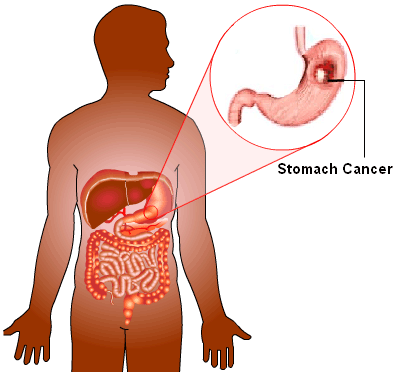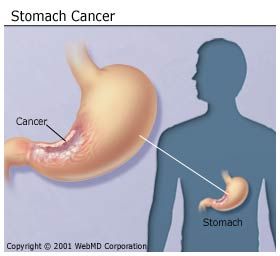Cancer of the Stomach
Roughly 23,000 new cases are diagnosed each year in the United states. It is 10 times more common in Japan, occurring more frequently in men than in women and in African-Americans. The average age at the time of diagnosis is 60 years. Unfortunately, most patients are diagnosed in advanced stages when cure is not possible.
Cause
The actual cause of stomach cancer is unknown. However, people with blood type A and a history of pernicious anemia are at a greater risk of developing this cancer.
Signs and symptoms
Cancer of the stomach can grow for a long time without causing any problems. Most patients are diagnosed in advanced stages and present with any of the following signs:
- Abdominal pain
- Weight loss
- Nausea, vomiting, vomiting blood.
- Anemia
Diagnosis
When suspected, an endoscopy study of the stomach should be performed. This procedure will allow for obtaining a biopsy at the same time. A CT scan or Ultrasound examination of the abdomen may establish the extent of the cancer.
Staging
Endoscopic ultrasound is a very sensitive study that should be done to determine the depth of invasion of the cancer into the tissues around the stomach, as well as evaluation of the local lymph glands. CT Scan of the abdomen and bone scans may have to be done to complete the staging work up.
Treatment
Surgery: Management of this disease relies on a surgical attempt to remove most or all of the stomach and to reconstruct the continuity of the bowels. This is a rather difficult procedure and carries a very high risk, even in the best hands.
Chemotherapy is appropriate for patients in whom the disease is not cured with surgery. Adriamycin, VP-16, Cisplatinum, Mitomycin, 5-FU and Leucovorin are among the most commonly used drugs for stomach cancer. These drugs are used in combination and can have moderate to severe toxic effects.
Radiation: For the most part, it is used to control the symptoms of the advanced disease. Radiation can also be combined with chemotherapy.
Pattern of Spread
If left untreated, or if it fails to respond to treatment, stomach cancer can spread to the liver, lymph glands in the abdomen, lungs, and almost anywhere else.
Prognosis
In most Americans, this cancer carries a very poor prognosis due to the advanced stage of the illness at the time of diagnosis. In such cases, survival is short. The disease can be cured only if it is caught very early.
Special Situations
Patients with advanced stomach cancer may develop any of the following complications.
- Pleural effusion
- Bone metastasis
- Paraneoplastic syndromes
- High calcium level
- Pain
Survival
Survival of patients with this cancer depends on the extent of the cancer at the time of initial diagnosis. One-third of patients with early stages may be cured with surgery alone. In the majority of patients in whom a cure is not possible, survival could vary from months to years, depending on the extent of the cancer and overall condition of the patient, as well as the response to treatment and the duration of the response.
Follow-up
After completion of treatment, in any combination that might have taken place, patients need to remain under surveillance for the possibility of a recurrence of cancer. Follow-up should be scheduled on a regular basis -- initially, every one to three months for one to two years. The frequency of follow-up will depend on the condition of the patient and his/her disease. In each follow-up visit, patients are examined and, normally, an endoscopy as well as a CT scan of the abdomen is obtained at intervals.
Treatment of advanced or recurrent disease will depend on the stage and extent of the reoccurred disease. Most patients are then treated with chemotherapy, using the same agents mentioned above. Radiation therapy may be helpful in managing painful or symptomatic areas to which the cancer has spread. If patients experience pain, various pain medications may be used to alleviate the pain. For patients with advanced disease, where most treatments have failed, one could consider assistance from hospice.
Stomach Cancer
Stomach Cancer
Stomach Cancer
Stomach Cancer
Stomach Cancer



